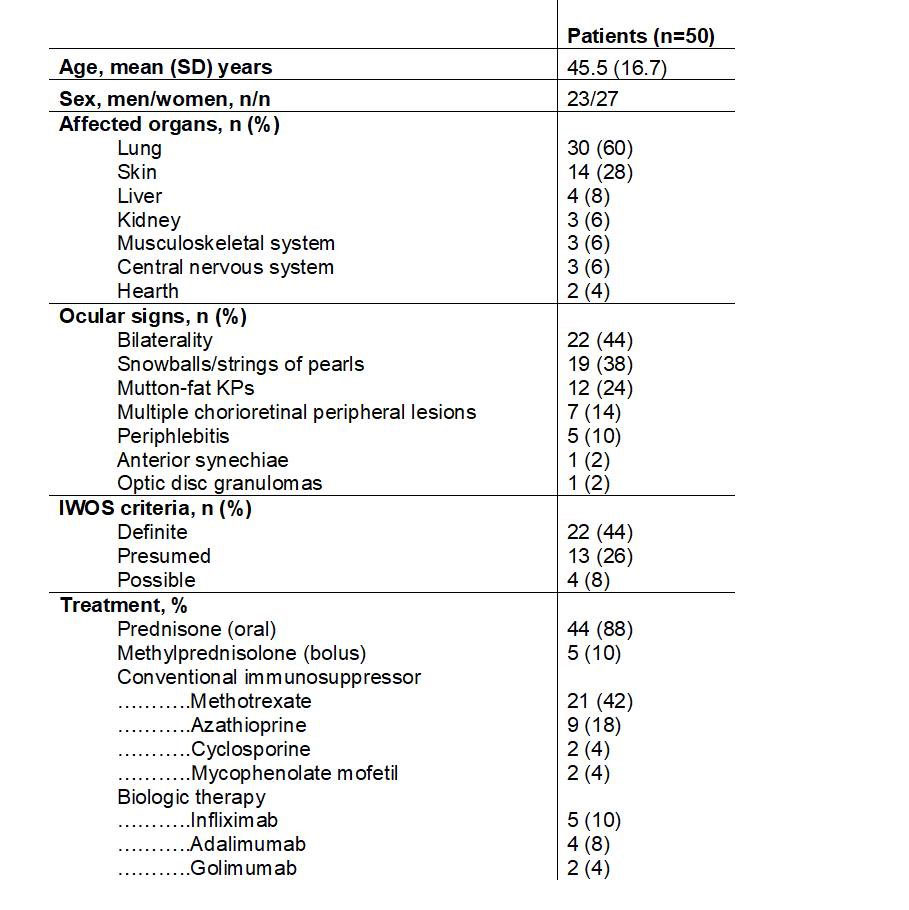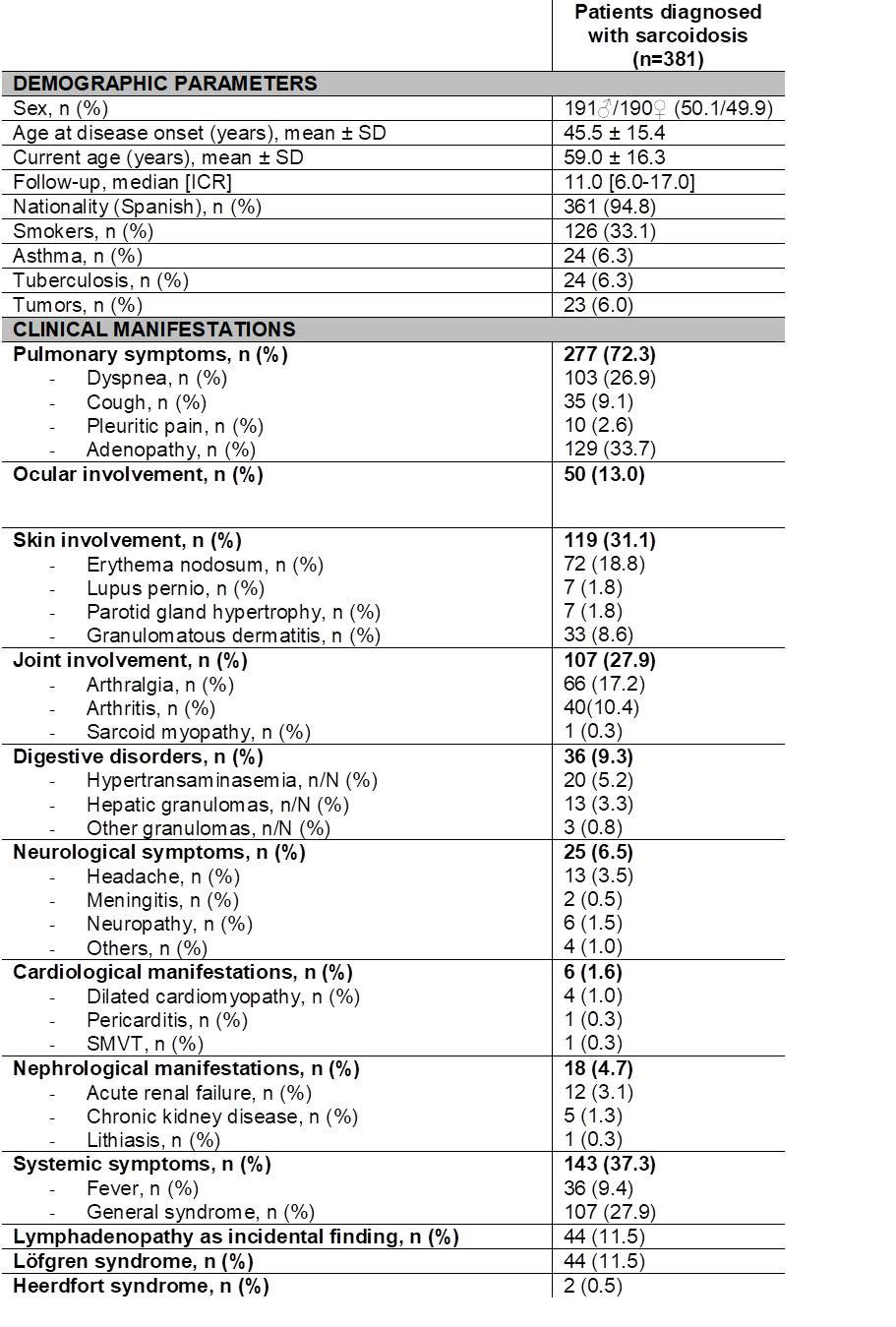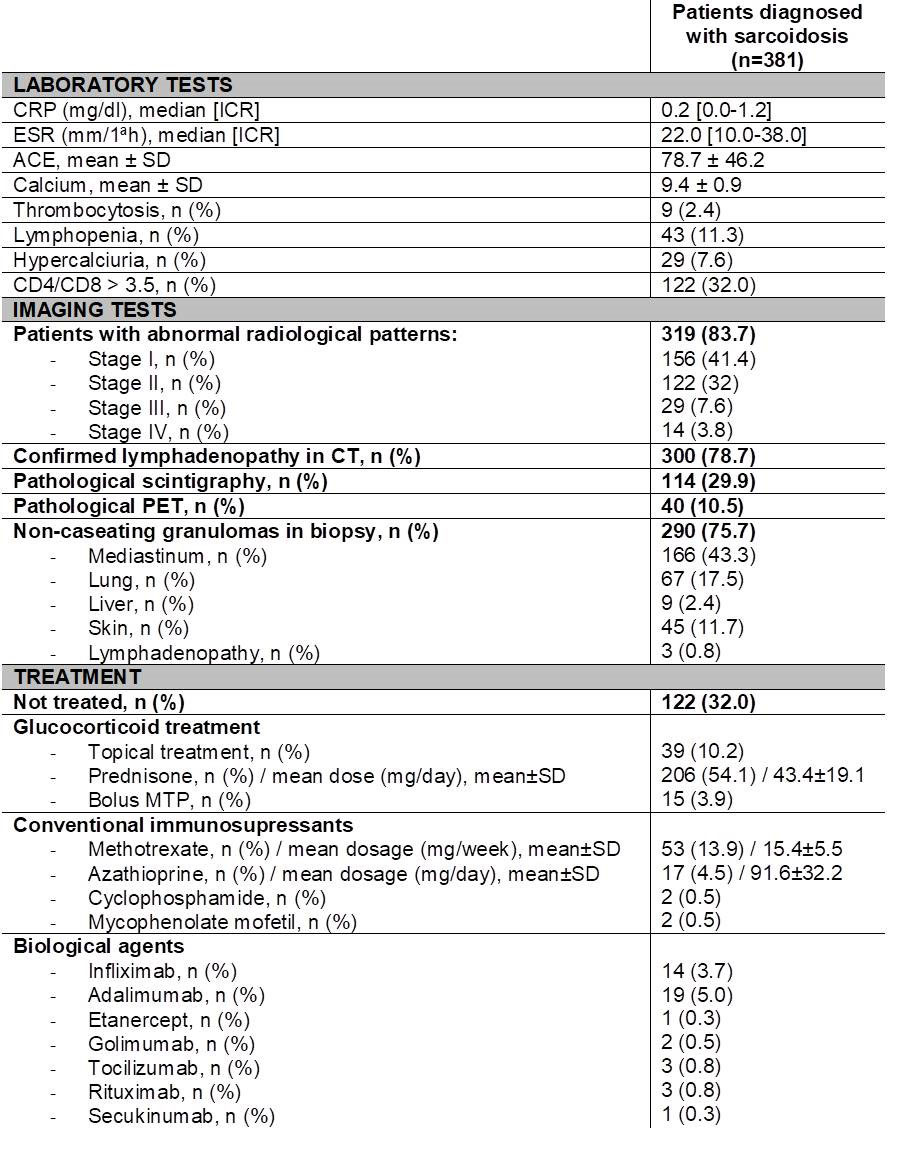Session Information
Session Type: Poster Session (Sunday)
Session Time: 9:00AM-11:00AM
Background/Purpose: Sarcoidosis is a multisystemic inflammatory disease characterized by non-caseating epitheliod granulomas. Ocular involvement is the presenting symptom in approximately 20-30% in form of uveitis, conjunctivitis, episcleritis/scleritis, optical nerve disease or orbital inflammation. Our objective was to define an epidemiological context in the last 2 decades, focusing on the ocular affectation and its correlation with the IWOS (International Workshop on Ocular Sarcoidosis) criteria, which classify ocular sarcoidosis as definitive, presumed, probable and possible, according to certain ophthalmological and analytical findings. They are very useful if a biopsy is not obtained or it is negative
Methods: Retrospective study of patients admitted to a single reference University Hospital between 01/01/1999 and 01/01/2019 with diagnosis of sarcoidosis trough biopsy and/or compatible symptoms and imaging tests. Demographics features, clinical findings, complementary tests and treatment were recorded.
Results: We studied 381 patients (190 women/191 men), mean age at diagnosis 45.5±15.4 years, 94.8% of Spanish nationality. 33% were smokers and 6.3% had had tuberculosis. The incidence rate of sarcoidosis was 3.3 cases/ 100,000 people/year, like other national series. The most affected organ was lung (72.3%), followed by skin (31%) (TABLE 1). In addition, at diagnosis 11.5% and 0.5% of patients had a Löfgren and a Heerdfort syndrome, respectively. A simple x-ray chest was performed in all patients, with alterations in 83.7%, the majority at stages I and II. Moreover, 29.9% and 10.5% presented pathological scintigraphy and PET scan, respectively. A biopsy was performed in 81.9% of the cases, with a mediastinal approach in 43.3%. After a median follow-up of 11.0 [6.0-17.0] years, 32% had never received treatment and in the remaining 68% the most used therapy was oral glucocorticoids. Other therapies were conventional and/or biological immunosuppressants (TABLE 2).
Besides, patients with ocular involvement were selected (n=50, 13%), 40 of them with uveitis. Thirty-nine patients (78%) met one of the 4 IWOS diagnostic categories: 22 definite (44%), 13 presumed (26%) and 4 possible (8%) sarcoidosis. The most common ocular signs were bilaterality (44%), snowballs or strings of pearls (38%), mutton-fat KPs (24%), multiple chorioretinal peripheral lesions (14%) and periphlebitis (10%). Regarding the treatment of this group, 44 patients (88%) received oral corticosteroids, 21 (42%) methotrexate, 11 (21%) another conventional immunosuppressor and 11 (21%) a biological treatment. TABLE 3 shows the main demographic and clinical features of this group.
Conclusion: The results obtained are reproducible to those published in national and international series, except for the non-predominance of females and the highest percentage of ocular involvement in our study. Currently, biological treatment (especially anti-TNF) is used more frequently. In our population the IWOS criteria had a sensitivity of 78%. Even though there is no gold standard for diagnosing ocular sarcoidosis yet, IWOS signs can help clinicians suspect it.
To cite this abstract in AMA style:
Sanchez-Bilbao L, Atienza-Mateo B, Gonzalez-Mazon I, Martín-Varillas J, Demetrio R, Calvo-Río V, Peña Sainz-Pardo E, Fernandez-Ramon R, Gaitan-Valdizan J, Gonzalez-Gay M, Blanco R. Systemic and Ocular Sarcoidosis Study of 381 Patients from a Single Universitary Centre in the Last 20 Years [abstract]. Arthritis Rheumatol. 2019; 71 (suppl 10). https://acrabstracts.org/abstract/systemic-and-ocular-sarcoidosis-study-of-381-patients-from-a-single-universitary-centre-in-the-last-20-years/. Accessed .« Back to 2019 ACR/ARP Annual Meeting
ACR Meeting Abstracts - https://acrabstracts.org/abstract/systemic-and-ocular-sarcoidosis-study-of-381-patients-from-a-single-universitary-centre-in-the-last-20-years/



